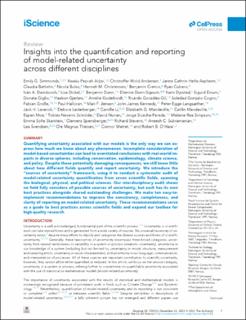Insights into the quantification and reporting of model-related uncertainty across different disciplines
Simmonds, Emily Grace; Dunn-Sigouin, Etienne; Adjei, Kwaku Peprah; Andersen, Christoffer Wold; Aspheim, Janne Cathrin Hetle; Battistin, Claudia; Bulso, Nicola; Christensen, Hannah M.; Cretois, Benjamin; Cubero, Ryan John Abat; Davidovich, Ivan Andres; Dickel, Lisa; Dunn, Benjamin Adric; Dyrstad, Karin; Einum, Sigurd; Giglio, Donata; Gjerløw, Haakon; Godefroidt, Amélie; González-Gil, Ricardo; Gonzalo Cogno, Soledad; Große, Fabian; Halloran, Paul; Jensen, Mari Fjalstad; Kennedy, John James; Langsæther, Peter Egge; Laverick, Jack H; Lederberger, Debora; Li, Camille; Mandeville, Elizabeth G; Mandeville, Caitlin; Moe, Espen; Schröder, Tobias Navarro; Nunan, David; Sicacha-Parada, Jorge; Simpson, Melanie Rae; Skarstein, Emma Sofie; Spensberger, Clemens; Stevens, Richard; Subramanian, Aneesh C.; Svendsen, Lea; Theisen, Ole Magnus; Watret, Connor; O'Hara, Robert B.
Peer reviewed, Journal article
Published version
Permanent lenke
https://hdl.handle.net/11250/3044484Utgivelsesdato
2022Metadata
Vis full innførselSamlinger
- Publikasjoner fra CRIStin - NINA [2364]
- Scientific publications [1392]
Originalversjon
10.1016/j.isci.2022.105512Sammendrag
Quantifying uncertainty associated with our models is the only way we can ex-
press how much we know about any phenomenon. Incomplete consideration of
model-based uncertainties can lead to overstated conclusions with real-world im-
pacts in diverse spheres, including conservation, epidemiology, climate science,
and policy. Despite these potentially damaging consequences, we still know little
about how different fields quantify and report uncertainty. We introduce the
‘‘sources of uncertainty’’ framework, using it to conduct a systematic audit of
model-related uncertainty quantification from seven scientific fields, spanning
the biological, physical, and political sciences. Our interdisciplinary audit shows
no field fully considers all possible sources of uncertainty, but each has its own
best practices alongside shared outstanding challenges. We make ten easy-to-
implement recommendations to improve the consistency, completeness, and
clarity of reporting on model-related uncertainty. These recommendations serve
as a guide to best practices across scientific fields and expand our toolbox for
high-quality research.

